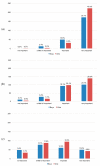Knowledge about Hand Hygiene and Related Infectious Disease Awareness among Primary School Children in Germany
- PMID: 35204911
- PMCID: PMC8870042
- DOI: 10.3390/children9020190
Knowledge about Hand Hygiene and Related Infectious Disease Awareness among Primary School Children in Germany
Abstract
Hand hygiene is a cornerstone of infection prevention. However, few data are available for school children on their knowledge of infectious diseases and their prevention. The aim of the study was to develop and apply a standardized questionnaire for children when visiting primary schools to survey their knowledge about infectious diseases, pathogen transmission and prevention measures. Enrolling thirteen German primary schools, 493 questionnaires for grade three primary school children were included for further analyses, comprising 257 (52.1%) girls and 236 (47.9%) boys with an age range of 8-11 years. Out of 489 children, 91.2% participants indicated that they knew about human-to-human transmissible diseases. Of these, 445 children responded in detail, most frequently mentioning respiratory and gastrointestinal diseases, followed by childhood diseases. Addressing putative hygiene awareness-influencing factors, it was worrisome that more than 40.0% of the children avoided visiting the sanitary facilities at school. Most of the children (82.9%) noted that they did not like to use the sanitary facilities at school because of their uncleanliness and the poor hygienic behavior of their classmates. In conclusion, basic infection awareness exists already in primary school age children. Ideas about the origin and prevention of infections are retrievable, however, this knowledge is not always accurate and adequately contextualized. Since the condition of sanitary facilities has a strong influence on usage behavior, the child's perspective should be given more consideration in the design and maintenance of sanitary facilities.
Keywords: Germany; North Rhine–Westphalia; hand hygiene; infection prevention; infectious disease; primary school children; questionnaire; sanitary facilities.
Conflict of interest statement
K.B. and S.S. were supported by EU/INTERREG grants. S.S. is an employee of Ophardt Hygiene-Technik GmbH + Co. KG. The remaining authors have no conflicts of interest to declare.
Figures



Similar articles
-
Assessment of factors influencing hygiene behaviour among school children in Mereb-Leke District, Northern Ethiopia: a cross-sectional study.BMC Public Health. 2014 Sep 26;14:1000. doi: 10.1186/1471-2458-14-1000. BMC Public Health. 2014. PMID: 25256291 Free PMC article.
-
Effects of sanitary pad distribution and reproductive health education on upper primary school attendance and reproductive health knowledge and attitudes in Kenya: a cluster randomized controlled trial.Reprod Health. 2021 Aug 31;18(1):179. doi: 10.1186/s12978-021-01223-7. Reprod Health. 2021. PMID: 34465344 Free PMC article. Clinical Trial.
-
Crisis in our schools: survey of sanitation facilities in schools in Bloomsbury health district.BMJ. 1990 Nov 10;301(6760):1085-7. doi: 10.1136/bmj.301.6760.1085. BMJ. 1990. PMID: 2249074 Free PMC article.
-
Prevalence and predisposing factors regarding intestinal parasitic infections among rural primary school pupils at Minia Governorate, Egypt.J Public Health Afr. 2011 Sep 5;2(2):e29. doi: 10.4081/jphia.2011.e29. eCollection 2011 Sep 5. J Public Health Afr. 2011. PMID: 28299070 Free PMC article. Review.
-
Impact of water, sanitation, and hygiene interventions on improving health outcomes among school children.J Environ Public Health. 2013;2013:984626. doi: 10.1155/2013/984626. Epub 2013 Dec 28. J Environ Public Health. 2013. PMID: 24454415 Free PMC article. Review.
Cited by
-
A clinical trial evaluation of handwashing products and educational resources to improve hand hygiene in paediatric patients and school children.Front Public Health. 2024 Sep 23;12:1427749. doi: 10.3389/fpubh.2024.1427749. eCollection 2024. Front Public Health. 2024. PMID: 39421809 Free PMC article. Clinical Trial.
References
-
- World Health Organization . WHO Guidelines on Hand Hygiene in Health Care: A Summary. WHO/IER/PSP/2009.07 ed. WHO Press; Geneva, Switzerland: 2009.
Grants and funding
LinkOut - more resources
Full Text Sources

